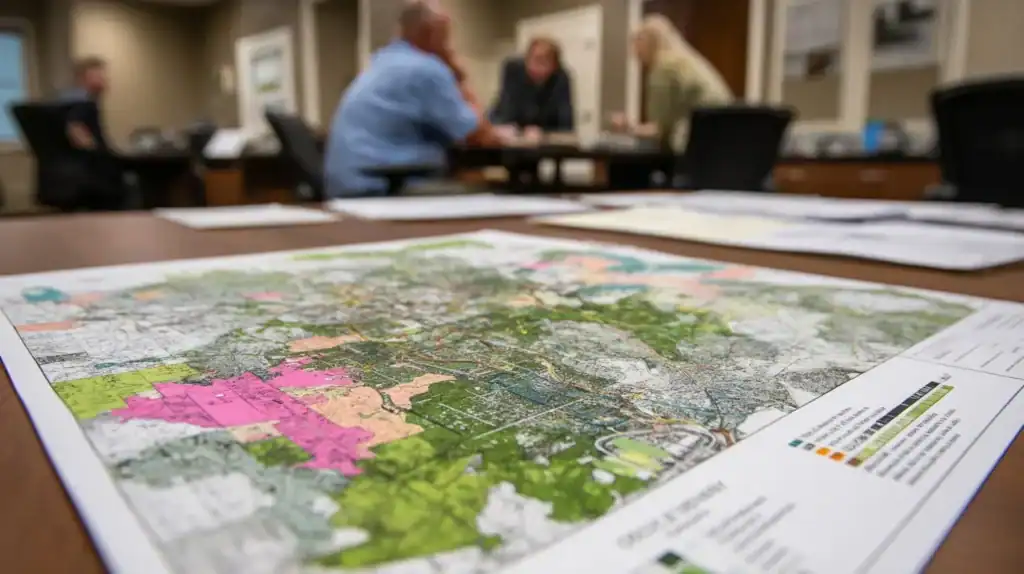
Moore County Government Legal Policy Updates

If you’re looking for the big-picture changes that shape what can be built, where, and when in Moore County, North Carolina, the municipal law attorneys from Van Camp, Meacham & Newman, PLLC are here to help. These county-wide decisions set the rules of the road for rezonings, subdivision approvals, and infrastructure sequencing in unincorporated areas—and they influence how towns coordinate growth at their borders.
Understanding these policy updates in Moore County will help interested parties frame plan-consistency arguments, anticipate utility and traffic requirements, and time applications to upcoming hearings.
Join us as we explore what’s moving now and why it matters for your future project developments.
Table of Contents
Countywide Updates In Moore County
These county-level actions set the framework for rezonings, subdivisions, and infrastructure decisions across the unincorporated areas and influence how towns coordinate growth.
2025 Land Use Plan Update
Public Hearing Held October 2, 2025
Moore County is finalizing a 2025 Land Use Plan that will guide where housing, commercial projects, and infrastructure should go. Once adopted, boards will use it to decide whether rezoning requests match the plan and to prioritize utilities, roads, and other services in the right places.
Expect the plan to map out growth areas versus rural preservation areas, which can affect project timelines, utility extensions, and the likelihood of approval.
Sheriff’s Forensic Facility Funding
Approved September 16, 2025
The County approved $4 million to build a new forensic center near the Rick Rhyne Public Safety Center. The goal is to process evidence locally, speed up case work, and reduce reliance on state or private labs. The project does not raise county taxes, while outside agencies may pay fees to use the facility.
Construction and operations planning will occur in phases, with site coordination near existing public-safety facilities to minimize disruption.
UDO Amendment for Gated Districts
Tabled / Not Advancing
This zoning proposal would have allowed large new subdivisions in gated communities like Seven Lakes and Woodlake. The amendment was set aside due to concerns about whether water and sewer systems can handle added demand, potential traffic and stormwater impacts, and the need to wait for the countywide Land Use Plan to be finished first.
For now, existing limits in those districts remain in place, so major subdivision proposals there are unlikely to move forward without a broader policy change.
Aberdeen: Housing and Mixed-Use Projects Moving Forward
Aberdeen is advancing two significant neighborhood-scale projects that add new homes and, in one case, local retail. These actions will influence traffic patterns, utility planning, and how open space and amenities are built and maintained over time.
“Ten Pines” 305-Home Planned Development
Upcoming BOC Hearing on October 27, 2025
The 122-acre Ten Pines development project proposed near NC-5/Olivia Lane is scheduled for a Board of Commissioners hearing after review by the Planning Board. Key review items include the street and lot layout, open-space networks, pedestrian connections, and how the plan fits Aberdeen’s growth policies.
If approved, expect conditions on traffic mitigation, stormwater management, and construction phasing so infrastructure and public services scale with the project.
Sandhills Station Mixed-Use Rezoning
Approved October 28, 2024
Aberdeen’s rezoning plan includes about 103 acres at US-15/501 and Pee Dee Road to allow roughly 325 homes—both affordable and market-rate—along with neighborhood retail. As the project moves into design and permitting, expect coordination on utilities, road improvements, stormwater, and phasing to ensure services keep pace with construction.
The mixed-use format is intended to place daily needs closer to homes, which can reduce driving for residents and support small businesses.
Carthage: Updates to Local Ordinances and Historic Preservation
Carthage is adjusting its planning and preservation framework to simplify development processes while shifting how historic properties are reviewed. These changes affect how projects move through zoning and how property owners approach historic designations.
Historic Preservation Commission Removed
Approved February 17, 2025
The Carthage Board of Commissioners voted to dissolve the town’s Historic Preservation Commission by removing Section 100.35 from the Unified Development Ordinance. This change moves the town toward a voluntary preservation model without mandatory local design standards or overlay districts. The shift aims to streamline development approvals but also places greater responsibility on owners to pursue preservation options independently.
Property owners with historically significant structures are encouraged to explore state and federal recognition programs, such as National Register listings or preservation tax credits, for guidance and potential financial benefits.
Unified Development Ordinance Reorganized
Adopted In October 2024; Ongoing Updates
Carthage adopted a reorganized Unified Development Ordinance (UDO) in October 2024 that consolidates zoning and subdivision regulations into a single, user-friendly document aligned with North Carolina Chapter 160D requirements. The town continues to refine the ordinance throughout 2025 to better implement its 2040 Land Use Plan and clarify standards for housing, commercial uses, and infrastructure.
The goal is to create more predictable review timelines and make it easier for applicants, surveyors, and builders to navigate the approval process.
Pinehurst: Ordinance Updates and New Residential Growth
Pinehurst is actively refining its local development rules and overseeing new residential growth to match the village’s small-town character. Ongoing ordinance updates and zoning decisions reflect a focus on clear standards, manageable traffic, and balanced expansion.
Development Ordinance (PDO) Overhaul
Hearings Ongoing In 2025
Pinehurst is in the process of updating its Development Ordinance (PDO) to modernize zoning and subdivision standards. The goal is to simplify procedures, align with state law, and ensure development remains consistent with the 2019 Comprehensive Plan. Public workshops and hearings held throughout 2025 allow residents and builders to give input on design standards, land use categories, and project review steps.
Once adopted, the new PDO is expected to make permitting more predictable while maintaining the design quality the community values.
Downtown Parking Ordinance #25-04
Effective July 1, 2025
New time-limit rules for parking in the Village Center took effect July 1, 2025, under Ordinance #25-04. These changes are meant to improve parking turnover, ease congestion, and support downtown businesses.
Property owners and business operators should review the new time limits and plan for access, deliveries, and customer parking needs to avoid disruptions. The village may continue evaluating parking data to adjust enforcement or designate new spaces as demand shifts.
Trotter Drive Rezoning for 48 Homes
Approved March 28, 2025
The Village Council approved rezoning for an 8-acre parcel near NC-5 to allow 48 detached cottages. The project was revised to reduce density and align with the Pinehurst South small-area plan, which encourages modest, neighborhood-scale housing.
The development now moves into the site plan and permitting stage, where details on landscaping, stormwater control, and connectivity will be reviewed to ensure it fits surrounding residential areas.
Southern Pines: Preservation Efforts and Housing Diversity
Southern Pines continues to balance preservation of its cultural landmarks with strategies to expand housing options. Recent approvals reflect both priorities—protecting historic sites while allowing for new types of residential development in established neighborhoods.
Our Lady of Victory Historic Site Nomination
Approved September 23, 2025
The Town Council voted to support adding the historic Our Lady of Victory site in West Southern Pines to the National Register of Historic Places. This church complex is a cornerstone of the town’s Black heritage, and the nomination opens the door to recognition, preservation grants, and potential tax incentives.
The move signals the town’s commitment to protecting important cultural landmarks while promoting community awareness of their historic value.
“Missing Middle” Duplex Rezoning on North Hardin Street
Approved August 12, 2025
Southern Pines approved a rezoning plan allowing duplex housing on North Hardin Street, expanding the town’s range of housing types. The change aligns with the 2040 Comprehensive Plan’s goal of creating more “missing middle” housing—homes that are more affordable than single-family houses but still fit within neighborhood character.
The project was carefully reviewed to address traffic, environmental impact, and compatibility with nearby homes, reflecting the town’s effort to meet housing demand responsibly.
What These Changes Mean For Property Owners and Developers
These land and development changes throughout Moore County will influence entitlement strategies, application materials, and project timing throughout the region. Property owners, developers, and building project managers can streamline projects that adhere to changes by:

- Aligning With Adopted Plans: Demonstrate how your proposal supports the County Land Use Plan and applicable small-area or comprehensive plans; clear plan consistency helps boards make required findings.
- Coordinate Infrastructure Early: Secure water and sewer capacity letters, address traffic and stormwater, and clarify phasing—early coordination reduces delays during hearings.
- Anticipate Parking and Operations Constraints: In infill or downtown areas, integrate shared parking, delivery schedules, and pedestrian circulation into site design to meet new operational expectations.
- Reassess Preservation Pathways: With Carthage’s HPC dissolved and Southern Pines elevating heritage recognition, evaluate state and federal nominations, tax credits, and documentation needs early in the planning process.
How To Prepare Stronger Project Applications for Approval
A focused preparation process can improve outcomes and reduce continuances for building projects throughout Moore County:

- Consistency Statement and Findings: Tie uses, density, and design standards directly to adopted plan language; cite relevant policies and maps to support board findings.
- Infrastructure and Phasing Exhibits: Provide utility confirmation, traffic mitigation, stormwater concepts, and any proposed phasing to address capacity and timing concerns.
- Neighborhood Engagement Summary: Document outreach, summarize feedback, and note design revisions that respond to specific stakeholder issues.
- Conditions and Development Agreements: Where appropriate, propose enforceable conditions or agreements that clarify open space, transportation improvements, and construction sequencing.
How Van Camp, Meacham & Newman, PLLC Can Help
Our attorneys are experienced in construction litigation, assisting clients across Moore County with the legal strategy and documentation needed to navigate local government processes efficiently and effectively. We represent landowners, developers, HOAs, and businesses before planning boards, councils, and county commissions.
Our skilled team of NC lawyers work with clients for:

- Zoning, Rezoning, and Text Amendments: We prepare plan-consistency analyses, draft conditions, and present at hearings to position projects for approval.
- Real Estate and Land Use Transactions: We handle due diligence, title, easements, covenants, development agreements, and contract negotiations tied to entitlements.
- Municipal and Administrative Law: We guide clients through permitting, appeals, code enforcement, and ordinance interpretation under Chapter 160D.
- Condemnation and Property Rights: We advise on right-of-way, takings, and compensation issues that may arise with infrastructure or public projects.
- Civil Litigation and Dispute Resolution: When necessary, we protect client interests in court or through mediation related to development approvals, contracts, or property rights.
Contact Our Experts In NC Municipal Law Today
If your property or project could be affected by the Moore County Land Use Plan, town ordinance updates, or pending rezonings, our attorneys are ready to help. The real estate attorneys at Van Camp, Meacham & Newman, PLLC provides comprehensive support in municipal law, land use and zoning, real estate transactions, condemnation, contracts, and civil litigation. Contact us today to discuss your goals, evaluate risks, and develop a strategy to move forward with confidence. Call 910-295-2525 or fill out our convenient contact form below to get started.

